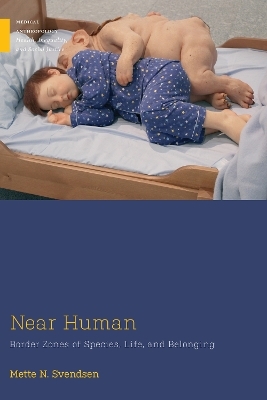
Near Human
Border Zones of Species, Life, and Belonging
Seiten
2021
Rutgers University Press (Verlag)
978-1-9788-1821-7 (ISBN)
Rutgers University Press (Verlag)
978-1-9788-1821-7 (ISBN)
Near Human is an ethnography of research piglets in biomedical experiments and premature human infants in clinical care in Denmark. Drawing on fieldwork carried out on farms, in animal-based science labs, and in hospitals, Mette N. Svendsen redirects the question of "what it means" to be human to "what it takes" to be human and to forge a nation.
Near Human takes us into the borders of human and animal life. In the animal facility, fragile piglets substitute for humans who cannot be experimented on. In the neonatal intensive care unit, extremely premature infants prompt questions about whether they are too fragile to save or, if they survive, whether they will face a life of severe disability. Drawing on ethnographic fieldwork carried out on farms, in animal-based experimental science labs, and in hospitals, Mette N. Svendsen shows that practices of substitution redirect the question of "what it means" to be human to "what it takes" to be human. The near humanness of preterm infants and research piglets becomes an avenue to unravel how neonatal life is imagined, how societal belonging is evaluated, and how the Danish welfare state is forged. This courageous multi-sited and multi-species approach cracks open the complex ethical field of valuating life and making different kinds of pigs and different kinds of humans belong in Denmark.
Near Human takes us into the borders of human and animal life. In the animal facility, fragile piglets substitute for humans who cannot be experimented on. In the neonatal intensive care unit, extremely premature infants prompt questions about whether they are too fragile to save or, if they survive, whether they will face a life of severe disability. Drawing on ethnographic fieldwork carried out on farms, in animal-based experimental science labs, and in hospitals, Mette N. Svendsen shows that practices of substitution redirect the question of "what it means" to be human to "what it takes" to be human. The near humanness of preterm infants and research piglets becomes an avenue to unravel how neonatal life is imagined, how societal belonging is evaluated, and how the Danish welfare state is forged. This courageous multi-sited and multi-species approach cracks open the complex ethical field of valuating life and making different kinds of pigs and different kinds of humans belong in Denmark.
METTE N. SVENDSEN is a professor of medical anthropology at the University of Copenhagen in Denmark.
List of Illustrations
Foreword by Lenore Manderson
Prologue
Introduction
1 Feeding: Cows, Pigs, and Humans
in Interspecies Kinship
2 Killing: Pigs as Sacrificeable Beings
3 Treating: Infants at the Margins of Life
4 Metabolizing: Humans and Nonhumans in a Global Field
Epilogue
Acknowledgments
Notes
References
Index
| Erscheinungsdatum | 04.11.2021 |
|---|---|
| Reihe/Serie | Medical Anthropology |
| Zusatzinfo | 14 b-w images |
| Verlagsort | New Brunswick NJ |
| Sprache | englisch |
| Maße | 152 x 229 mm |
| Gewicht | 3 g |
| Themenwelt | Sachbuch/Ratgeber ► Natur / Technik ► Natur / Ökologie |
| Medizin / Pharmazie ► Medizinische Fachgebiete ► Medizinethik | |
| Studium ► Querschnittsbereiche ► Geschichte / Ethik der Medizin | |
| Sozialwissenschaften ► Soziologie | |
| ISBN-10 | 1-9788-1821-1 / 1978818211 |
| ISBN-13 | 978-1-9788-1821-7 / 9781978818217 |
| Zustand | Neuware |
| Informationen gemäß Produktsicherheitsverordnung (GPSR) | |
| Haben Sie eine Frage zum Produkt? |
Mehr entdecken
aus dem Bereich
aus dem Bereich
Die Geschichte eines Weltzentrums der Medizin von 1710 bis zur …
Buch | Softcover (2021)
Lehmanns Media (Verlag)
17,95 €
von der Antike bis zur Gegenwart
Buch | Softcover (2024)
C.H.Beck (Verlag)
12,00 €
Krankheitslehren, Irrwege, Behandlungsformen
Buch | Softcover (2024)
C.H.Beck (Verlag)
39,95 €


